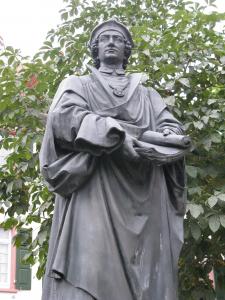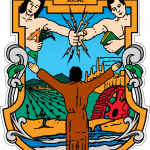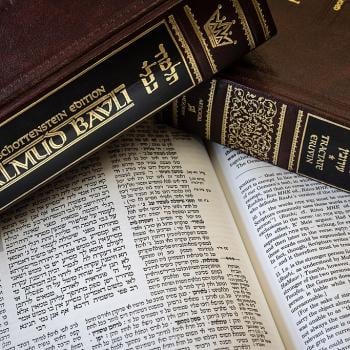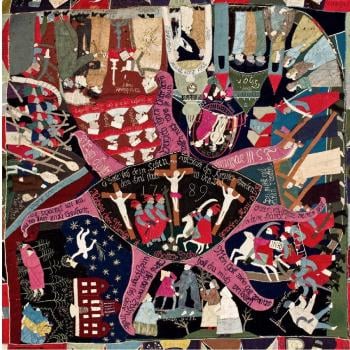
In the sixteenth century, accusations against the Jews led to the confiscation and examination of many important Jewish works, like the Talmud, in order to determine whether or not they should be destroyed. Some recent Jewish converts, combined with some influential Dominicans, had encouraged this, and the emperor, Maximillian I, at first followed their advice, until he stayed his decision and decided to ask the Archbishop of Mainz what he should done. Thankfully, the archbishop asked two scholars, one of them being Johannes Reuchlin, to examine the issue, and to write up what they recommended. As a result, Reuchlin wrote his brief, Recommendation Whether to Confiscate, Destroy and Burn All Jewish Books, in which his answer was no, preserving as a result, the great treasure trove of Jewish lore.[1]
Reuchlin believed that Jewish literature deserved not only to be preserved, but studied, and that their contents, even if sometimes hostile to the Christian faith, were filled with merit so that Christians should study and learn from them. They would help Christians realize what the Jews already knew and understood concerning their own books, not only in regards to the Torah, but also to the mystical tradition, the Kabbalah, which Reuchlin looked upon with favor because of how he saw it presented several points of contact with the Christian faith. Indeed, he thought that ancient Christian tradition, seen in the Church Fathers, indicated that Christians should be open to studying what was written down by Jewish scholars. If Origen, St. Jerome, and many others studied under and learned from rabbinic scholars, Christians have nothing to fear from such learning. Reuchlin agreed that, at times, there were elements of Jewish tradition which ran contrary to the Christian faith, but he thought to discard and ignore rabbinic lore was not only dangerous, but contrary to the example set by Jesus himself, who suggested that the wheat and tares will be together until the end of time:
Among all these learned and pious men, the defenders of our Christian Faith, there is not one who ever desired or wished that such books as those referred to above be burned or suppressed. Herby, do we but follow the dictates of our beloved Jesus Christ, as He instructed in Matthew 13:29f: ‘That we should not uproot tares with weed, lest we destroy the good fruit, but we should rather let both grow together until the harvest. And He explains, thereafter, just when this harvest is to take place: “The harvest is the end of the world.”[2]
What many priests used to indicate how we are to understand sinners in the church so that we do not lose faith when we see them side by side with saints, Reuchlin thought also applied to scholarship in general. We must not destroy what is good. Since what is good often comes to us in a mixed form, if we destroy what is riddled with contamination all too quickly, we will recklessly destroy the good, leading not to the purification of the good but its destruction.
Reuchlin knew that his opponents gave the objection that we put ourselves in danger if we study questionable material, tainted with errors. We would risk embracing the errors instead of learning the truth. This, Reuchlin believed, was nonsense. We cannot hide ourselves in some corner of the world where we will never be exposed to faulty reasoning or erroneous thoughts. We need to be exposed to it so that we will know what is being said and also discern how to counter it. By studying such material, we will be encouraged to respond to objections to our faith, and by doing so, we will come to know our faith better by finding the answers to such objections. Likewise, we will also come to be exposed to many truths and insights which we might not otherwise have received if we ignore such works. In this way, Reuchlin pointed to Moses, who had gained much wisdom from Egyptian learning:
And so says Aristotle in his book, Elenchoi, that the knowledge of evil is not evil, but rather good and righteous. What good could or might a Moses have been able to learn from the Egyptians, who were themselves devoted to idolatry, and worshiped cats, dogs, snakes and vipers for gods – as Saint Athenagoras, imperial legate and ambassador to Roman emperors Marcus Aurelius Antonius and Lucius Aurelius Commodus, writes regarding his mission to the Christians.[3]
It was not just Moses, but Solomon, Daniel and his companions, and others who gained great wisdom studying the knowledge found in various pagan traditions. It was not a sin to study such literature, but rather, it was a good because it allowed them to be that much more enlightened and capable of presenting the truth. Reuchlin said that as a result of such study, two things are possible: what is wrong will be known so that it can be confronted, while what is good and true, not found elsewhere, can be picked up and employed for the sake of the greater truth:
From this text, we may conclude that it is permissible to read and study good and evil side by side: the evil, so as to effectively combat it with reason; and the good, strewn among evil like roses among thorns, to be extracted for the sake of our Holy Teachings (c. turbat. ea. dis.).[4]
Reuchlin, likewise, thought it was absurd that classical pagan literature, which most people recognized were filled with great insight, was preserved because of what could be learned from them, but Jewish literature, which was more congruent with the Christian faith, was treated in a harsher manner:
Have not the books of the ancient poets been preserved, though they contain much more scandalous things than are to be found in the Talmud, and stand in much greater contrast to our Christian Faith than does the Talmud! Furthermore, all philosophy derives from Homer, the first poet, even though in his false tales he spared neither God nor the world. [5]
Reuchlin, throughout his response to Uriel, the Archbishop of Mainz, gave examples of what he thought could be learned from the Jews, and why it was important for Christians not only to preserve their writings, but to study them. He did not say Christians should agree with everything they read, for he acknowledged the distinction between the faiths and the disagreements they had with each other. Nonetheless, recognizing that there was a common core between the two traditions meant that what the Jews had explored and learned in relation to that common core is useful for all. Jews, for example, preserved the linguistic knowledge needed to understand the Torah in a way others did not; likewise, their scholars passed down the traditional understanding of Scripture, giving the foundation needed for understanding the Jewish context in which many of its books were written. Christian scholars, from the beginning, learned from their interpretations and used them for the Christian faith, and so if Jewish works were to be ignored, if not outright dismissed, then the Christian faith itself risk being called into question for the same reason such works were rejected.[6]
What Reuchlin established with his recommendation, that Jewish lore should not only be preserved but studied, was a conclusion which many of his contemporaries criticized and rejected, and yet what he established through it became the foundation for the preservation of the Jewish heritage itself. His work in defending the Jews against unjust censure helped keep many important works, even texts of the Bible in Hebrew itself, from being put into the flames, allowing Jewish lore and tradition to be preserved despite the spite issued against them from Christian anti-Semitism. But his recommendation, and what he suggested in regards the Jews, should be a lesson for Christians as a whole and how they should treat literature and the arts. While it can be argued that his claims have greater strength in regards Jewish lore because of its connection with the Christian faith, nonetheless, he based his ideas on how Christianity already recognized the good of learning and the preserving of pagan, non-Christian lore as a source of knowledge and inspiration for Christians. What is important deserves to be studied; if a work holds questionable ideas, that is not enough to discard it and reject any and all engagement of it. As Reuchlin noted, the knowledge and study of such material is not evil, but rather, can be and should be used for the promotion of the good. What is bad is willful ignorance, and that will hurt us more than reading and studying a text some find objectionable.
[1] As a result of his work, Reuchlin has often looked upon with much favor by the Jews, with the recognition that his work sometimes showed a bias against the Jews, he worked to overcome that bias and promote knowledge and defend the Jews when he saw the harm which was being done to them and to society as a whole.
[2] Johannes Reuchlin, Recommendation Whether to Confiscate, Destroy and Burn All Jewish Books. Trans. Peter Wortsman (New Nork: Paulist Press, 2000), 62.
[3] ibid.,53.
[4] ibid., 54. [Reuchlin then uses this to suggest why the Talmud should be studied, with the recognition that most of it is good and useful].
[5] ibid., 61.
[6] See ibid., 76.
Stay in touch! Like A Little Bit of Nothing on Facebook












